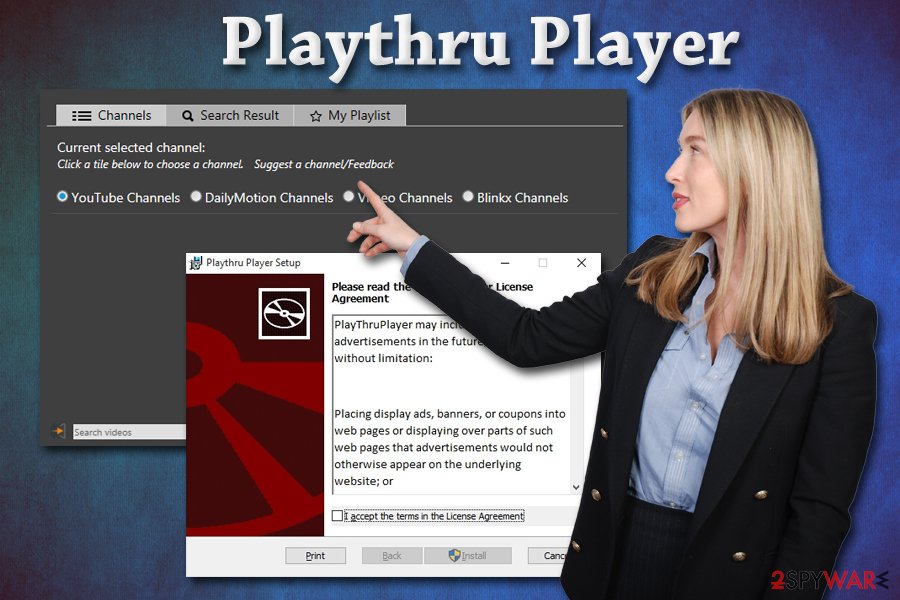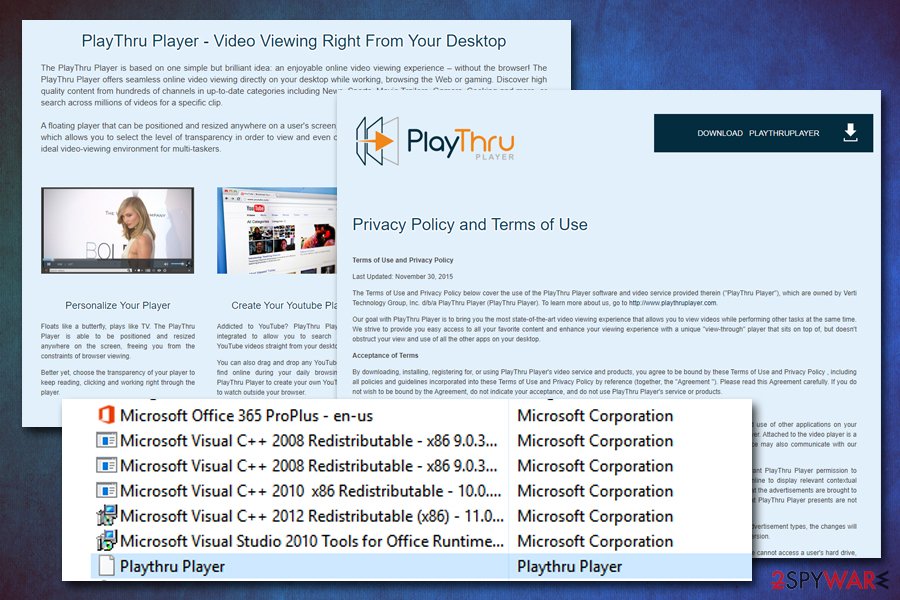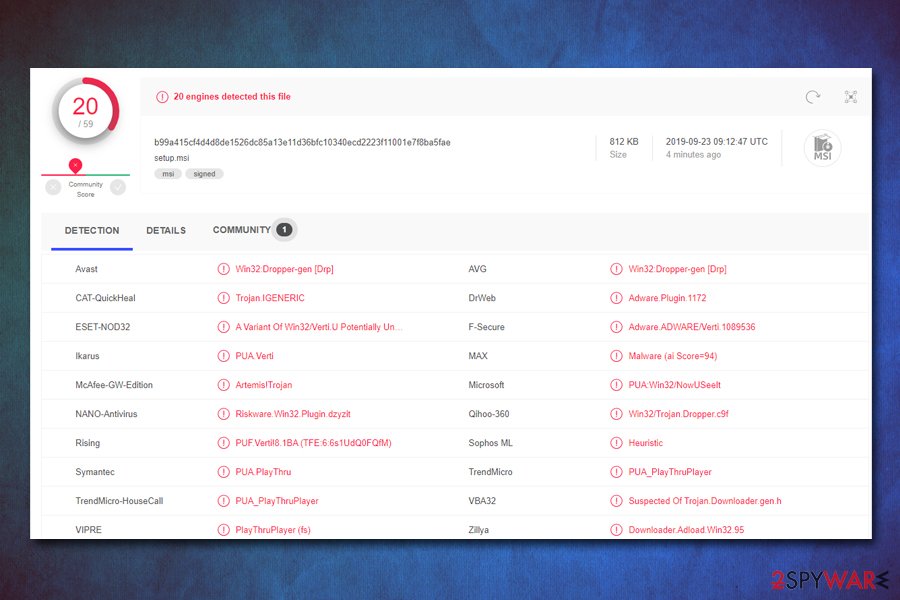Playthru Player removal explained (2019 update)
Playthru Player adware Removal Guide
What is Playthru Player Adware?
Playthru Player is a potentially unwanted program that gets into users' computers with the help of software bundle packages or fake Flash updates

Playthru Player is an application that is advertised as a useful media player that can be used for watching online videos from YouTube, Vimeo, DailyMotion, and other sites without using Google Chrome, Internet Explorer, Safari or Mozilla Firefox browsers. While the feature might seem attractive to users, they should be aware that Playthru Player is actually an adware[1] application that displays intrusive pop-ups, in-text links, coupons, deals, offers, advertising banners, and other commercial content whether they like it or not.
While some do install Playthru Player intentionally when looking for a video player,[2] most of the users found the app on their machines after downloading a fake Flash Player update or after the installation of freeware/shareware from third-party sites.
Possibly one of the most annoying traits of Playthru Player is that most of the users found it particularly difficult to uninstall the program – it is often missing from the Control Panel. In some cases, users found that the only way to remove Playthru Player is to download and install anti-malware software or a specific uninstaller app. For full instructions, please check the bottom section of the article.
| Name | Playthru Player |
| Type | Adware |
| Program executable | playthruplayer.exe |
| Location | C:\Program Files\playthruplayer |
| Installation | The application might be installed from various fishy sites intentionally, but most users found it on their computers after falling for a fake Adobe Flash update or the installation of shareware/freeware |
| Related risks | Redirects to suspicious sites, installation of other potentially unwanted software, money loss, etc. |
| Persistence | The app does not show up under the installed program list in the Control Panel |
| Symptoms | Intrusive ads, redirects, changed web browser settings, etc. |
| Termination | Manual uninstallation might be complicated if the app does not show up in the Control Panel. In such a case, we suggest you download and install FortectIntego or other security software and perform a full system scan |
Playthru Player may look useful if you are looking for a good online video player. Its developers claim:
The PlayThru Player is based on one simple but brilliant idea: an enjoyable online video viewing experience – without the browser! The PlayThru Player offers seamless online video viewing directly on your desktop while working, browsing the Web or gaming.
There are millions of apps created by various developers, and, while some are asking for a one-off payment to fund the project, most rely on a freeware scheme – a potentially unlimited monetization thanks to advertisements. Therefore, users should always be aware if they are installing the ad-sponsored program, as some of them might be extremely persistent (hard to remove) and expose users to unsafe content online.

Unfortunately, Playthru Player belongs to the latter category. Upon installation, users will often notice advertisements on all the sites that they visit. These ads are sometimes might be marked as follows:
- Ads by Playthru Player
- Powered by Playthru Player
- Playthru Player Ads
- Brought to you by PlayThru Player, etc.
Besides all types of ads, users might also encounter browser redirect tendencies – they might be rerouted to fake, tech support scam, phishing, spoofing, or even malware-laden sites. Therefore, it is vital to not click on anything until PlayThru Player removal is performed, as the content might be unsafe and result in the installation of other PUPs or even malware.
The excessive advertising and redirects are also followed by information gathering of infected users. For example, PlayThru Player developers might be harvesting data about users like search queries, IP address, technical details of the used device, links clicked, and sites visited, etc. The process is typical to adware apps and is used to serve users with targeted ads,[3] consequently increasing profits for both parties.
If you struggle to uninstall PlayThru Player, you should run a full system scan with anti-malware software, such as FortectIntego. Nevertheless, in some cases, you might be able to terminate the app via the Startup or the Control Panel – check our instructions at the bottom of this article.

Never rush the installation of new programs you obtain from the internet – adware might get installed along with them
As we have already mentioned, you have probably downloaded this program to your computer without even knowing it. Potentially unwanted programs are called so due to their sneaky installation methods and potentially harmful activities that they perform on the browser or computer once installed. Users often install adware without realizing that their browsers will be served with endless ads, or that the app's termination will be difficult. Nevertheless, most of the PUPs enter computer together with freeware from third-party sites.
In order to avoid sneaky programs entering your computer without your knowledge, experts[4] advise to never rush the installation process and click “Next” until you are done – it is the easiest way to install PUPs or even malware on your PC. Always pay close attention to the installation instructions, check for the important documents (ToS, Privacy Policy), decline all deals or offers, and always opt for Advanced/Custom settings, avoiding Recommended/Quick method. Besides, you should also equip your computer with anti-malware software that could warn you in some cases that you are installing an app that might be unsafe.
PlayThru Player removal steps
Technically, Playthru Player is not a virus. It's just a potentially unwanted program that has been actively used for promoting related parties. Besides, it may track you and collect personally non-identifiable information behind your back. To avoid revealing too much for people you don't even know, you should remove Playthru Player form your computer.

The fastest Playthru Player removal can be performed with the help of anti-malware software – it will also make sure that no other malicious components or other potentially unwanted programs are installed on the device. However, you might also try terminating the app via Control Panel – we provide the instructions below. However, as we already mentioned Playthru Player might sometimes not show up in there, although you might find it via the Startup.
Simply click on Start > All Programs and locate the PUP, then click Uninstall.
You may remove virus damage with a help of FortectIntego. SpyHunter 5Combo Cleaner and Malwarebytes are recommended to detect potentially unwanted programs and viruses with all their files and registry entries that are related to them.
Getting rid of Playthru Player adware. Follow these steps
Uninstall from Windows
Playthru Player might not show up on the installed program list. If it does, follow these steps:
Instructions for Windows 10/8 machines:
- Enter Control Panel into Windows search box and hit Enter or click on the search result.
- Under Programs, select Uninstall a program.

- From the list, find the entry of the suspicious program.
- Right-click on the application and select Uninstall.
- If User Account Control shows up, click Yes.
- Wait till uninstallation process is complete and click OK.

If you are Windows 7/XP user, proceed with the following instructions:
- Click on Windows Start > Control Panel located on the right pane (if you are Windows XP user, click on Add/Remove Programs).
- In Control Panel, select Programs > Uninstall a program.

- Pick the unwanted application by clicking on it once.
- At the top, click Uninstall/Change.
- In the confirmation prompt, pick Yes.
- Click OK once the removal process is finished.
Remove from Microsoft Edge
Delete unwanted extensions from MS Edge:
- Select Menu (three horizontal dots at the top-right of the browser window) and pick Extensions.
- From the list, pick the extension and click on the Gear icon.
- Click on Uninstall at the bottom.

Clear cookies and other browser data:
- Click on the Menu (three horizontal dots at the top-right of the browser window) and select Privacy & security.
- Under Clear browsing data, pick Choose what to clear.
- Select everything (apart from passwords, although you might want to include Media licenses as well, if applicable) and click on Clear.

Restore new tab and homepage settings:
- Click the menu icon and choose Settings.
- Then find On startup section.
- Click Disable if you found any suspicious domain.
Reset MS Edge if the above steps did not work:
- Press on Ctrl + Shift + Esc to open Task Manager.
- Click on More details arrow at the bottom of the window.
- Select Details tab.
- Now scroll down and locate every entry with Microsoft Edge name in it. Right-click on each of them and select End Task to stop MS Edge from running.

If this solution failed to help you, you need to use an advanced Edge reset method. Note that you need to backup your data before proceeding.
- Find the following folder on your computer: C:\\Users\\%username%\\AppData\\Local\\Packages\\Microsoft.MicrosoftEdge_8wekyb3d8bbwe.
- Press Ctrl + A on your keyboard to select all folders.
- Right-click on them and pick Delete

- Now right-click on the Start button and pick Windows PowerShell (Admin).
- When the new window opens, copy and paste the following command, and then press Enter:
Get-AppXPackage -AllUsers -Name Microsoft.MicrosoftEdge | Foreach {Add-AppxPackage -DisableDevelopmentMode -Register “$($_.InstallLocation)\\AppXManifest.xml” -Verbose

Instructions for Chromium-based Edge
Delete extensions from MS Edge (Chromium):
- Open Edge and click select Settings > Extensions.
- Delete unwanted extensions by clicking Remove.

Clear cache and site data:
- Click on Menu and go to Settings.
- Select Privacy, search and services.
- Under Clear browsing data, pick Choose what to clear.
- Under Time range, pick All time.
- Select Clear now.

Reset Chromium-based MS Edge:
- Click on Menu and select Settings.
- On the left side, pick Reset settings.
- Select Restore settings to their default values.
- Confirm with Reset.

Remove from Mozilla Firefox (FF)
Remove dangerous extensions:
- Open Mozilla Firefox browser and click on the Menu (three horizontal lines at the top-right of the window).
- Select Add-ons.
- In here, select unwanted plugin and click Remove.

Reset the homepage:
- Click three horizontal lines at the top right corner to open the menu.
- Choose Options.
- Under Home options, enter your preferred site that will open every time you newly open the Mozilla Firefox.
Clear cookies and site data:
- Click Menu and pick Settings.
- Go to Privacy & Security section.
- Scroll down to locate Cookies and Site Data.
- Click on Clear Data…
- Select Cookies and Site Data, as well as Cached Web Content and press Clear.

Reset Mozilla Firefox
If clearing the browser as explained above did not help, reset Mozilla Firefox:
- Open Mozilla Firefox browser and click the Menu.
- Go to Help and then choose Troubleshooting Information.

- Under Give Firefox a tune up section, click on Refresh Firefox…
- Once the pop-up shows up, confirm the action by pressing on Refresh Firefox.

Remove from Google Chrome
Because PUPs often change web browser settings, you should reset Google Chrome as follows:
Delete malicious extensions from Google Chrome:
- Open Google Chrome, click on the Menu (three vertical dots at the top-right corner) and select More tools > Extensions.
- In the newly opened window, you will see all the installed extensions. Uninstall all the suspicious plugins that might be related to the unwanted program by clicking Remove.

Clear cache and web data from Chrome:
- Click on Menu and pick Settings.
- Under Privacy and security, select Clear browsing data.
- Select Browsing history, Cookies and other site data, as well as Cached images and files.
- Click Clear data.

Change your homepage:
- Click menu and choose Settings.
- Look for a suspicious site in the On startup section.
- Click on Open a specific or set of pages and click on three dots to find the Remove option.
Reset Google Chrome:
If the previous methods did not help you, reset Google Chrome to eliminate all the unwanted components:
- Click on Menu and select Settings.
- In the Settings, scroll down and click Advanced.
- Scroll down and locate Reset and clean up section.
- Now click Restore settings to their original defaults.
- Confirm with Reset settings.

Delete from Safari
Remove unwanted extensions from Safari:
- Click Safari > Preferences…
- In the new window, pick Extensions.
- Select the unwanted extension and select Uninstall.

Clear cookies and other website data from Safari:
- Click Safari > Clear History…
- From the drop-down menu under Clear, pick all history.
- Confirm with Clear History.

Reset Safari if the above-mentioned steps did not help you:
- Click Safari > Preferences…
- Go to Advanced tab.
- Tick the Show Develop menu in menu bar.
- From the menu bar, click Develop, and then select Empty Caches.

After uninstalling this potentially unwanted program (PUP) and fixing each of your web browsers, we recommend you to scan your PC system with a reputable anti-spyware. This will help you to get rid of Playthru Player registry traces and will also identify related parasites or possible malware infections on your computer. For that you can use our top-rated malware remover: FortectIntego, SpyHunter 5Combo Cleaner or Malwarebytes.
How to prevent from getting adware
Protect your privacy – employ a VPN
There are several ways how to make your online time more private – you can access an incognito tab. However, there is no secret that even in this mode, you are tracked for advertising purposes. There is a way to add an extra layer of protection and create a completely anonymous web browsing practice with the help of Private Internet Access VPN. This software reroutes traffic through different servers, thus leaving your IP address and geolocation in disguise. Besides, it is based on a strict no-log policy, meaning that no data will be recorded, leaked, and available for both first and third parties. The combination of a secure web browser and Private Internet Access VPN will let you browse the Internet without a feeling of being spied or targeted by criminals.
No backups? No problem. Use a data recovery tool
If you wonder how data loss can occur, you should not look any further for answers – human errors, malware attacks, hardware failures, power cuts, natural disasters, or even simple negligence. In some cases, lost files are extremely important, and many straight out panic when such an unfortunate course of events happen. Due to this, you should always ensure that you prepare proper data backups on a regular basis.
If you were caught by surprise and did not have any backups to restore your files from, not everything is lost. Data Recovery Pro is one of the leading file recovery solutions you can find on the market – it is likely to restore even lost emails or data located on an external device.
- ^ Adware. Techopedia. Where IT and Business Meet.
- ^ Playthru player removal. Microsoft. Community.
- ^ Targeted advertising. Wikipedia. The free encyclopedia.
- ^ Novirus. Novirus. Cybersecurity advice from the UK.





















